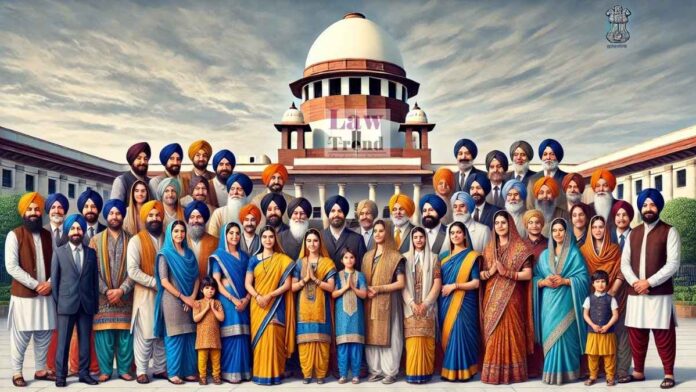In a significant plea before the Supreme Court, concerns have been raised regarding the bullying and ridicule faced by Sikh women and children due to their traditional attire and names. Advocate Harvinder Chowdhury presented these concerns as part of a public interest litigation aimed at banning websites that depict the Sikh community in a negative light, particularly through jokes that suggest they are of “low intellect, stupid, and foolish.”
The case, first ignited by a 2007 incident involving the arrest of a Mumbai-based publisher for derogatory content, resurfaced with Chowdhury’s PIL filed in 2015. Initially met with reluctance by the judiciary, the sustained efforts of Chowdhury have highlighted the deep psychological impact these stereotypes have on the community, pushing the issue into the judicial spotlight once again.
During today’s hearing, Justices BR Gavai and KV Viswanathan decided to postpone the decision for eight weeks, providing time for consolidation of suggestions from various Sikh Gurudwara Management Committees. Chowdhury, representing herself and the International Sikh Women Council, pointed out that the community’s women, often identified by their distinct turbans and white suits, are particularly vulnerable to public mockery, influencing the social perceptions and treatment they receive.
Children have not been spared either, with some reportedly shying away from using traditional Sikh titles such as ‘Kaur’ and ‘Singh’ to avoid schoolyard taunts. The hearing was particularly moved by a heart-wrenching account of a boy who died by suicide after being bullied relentlessly at school, which led to his family cutting his hair—an act deeply significant within the Sikh faith.
Despite previous judicial setbacks in 2017, where guidelines against such jokes were deemed outside judicial reach, the court appears to be considering new approaches to tackle the issue, especially focusing on sensitizing children in schools against such bullying. The discussion also touched upon the challenges posed by cyberbullying, emphasizing the need for robust measures to protect the community online.




